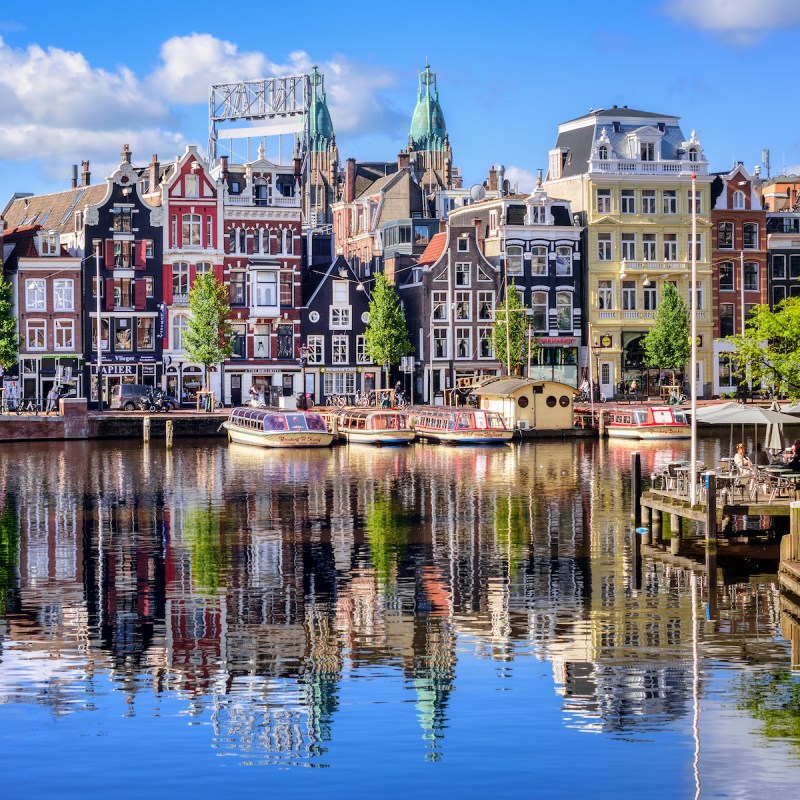
According to Global Finance Magazine, the Netherlands is number 5 on the list of the happiest countries in Europe to live in. That is a pretty good ranking, and you will see why retirees, locals, and foreigners love to spend their later life in this beautiful European country. The Netherlands is a small country: It’s a little less than twice the size of New Jersey, and the United Kingdom is six times bigger. It is bordered in the east by Germany, in the south by Belgium, and in the north and west by the North Sea. The location is responsible for the moderate maritime climate which generally means mild winters and cool summers.
Videos by TravelAwaits
That doesn’t mean that there can’t be snowfall, hot days in summer, and rain showers year round. The Netherlands is a kingdom and its current king, Willem-Alexander, and Queen Maxima (who was born in Argentina) are very popular with their people. So if retirees love a bit of pomp and circumstance and a few colorful festivals, they will love the Netherlands.

1. Open-Minded Society
The Netherlands may be a small country, but it is incredibly diverse. Since the 17th century, big cities like Amsterdam and Rotterdam have been a hub of international trade, and hence the center of influence from various cultures and religions around the world. These influences came mostly from the Far East, Africa, and the Caribbean. This means that nobody will bat an eyelash at people who look different than them — the Netherlands is a truly international nation. Opinions can, and are, freely voiced, and offense is very rarely taken. On the other hand, the Dutch are quite direct, something an expat might have to get used to — but once they have, will appreciate it.

2. No Language Problems
An expat in any country not their own relies heavily on being able to communicate. After all, there is a big difference between going somewhere exotic on a vacation for a few weeks and moving there to live. The good news is that there is no language problem in the Netherlands for English speakers. Dutch is the official language, but out of a population of 16.8 million people, 91 percent speak English.

3. Excellent Healthcare
The Netherlands is known for its excellent standard of health care and is rated as one of the best healthcare systems in the world. However, healthcare is not free. The government requires any adult living and/or working in the country to have a basic health insurance package. A doctor’s visit, for example, costs about $55, but a visit to the emergency room sets you back $300, so private health insurance makes great sense — although some costs are not covered or have to be paid upfront. Still, compared to the costs of medical treatment in the U.S., the Netherlands is very reasonable.

4. Cheap And Sustainable Transport
Of course, there are cars in the Netherlands, but the preferred means of transport for the Dutch are their feet and their bicycles. One of the first things you will notice if visiting a big city like Amsterdam is the crowded bicycle stands (I often wonder how people are able to ever find their bike) and the cyclists that far outnumber the pedestrians. A curiosity: they rarely wear helmets, sit ramrod straight, and wear their normal clothes, including heels. But walking from A to B is also popular, in cities as well as the countryside.
Retirees, even if they are fit, are happy to find that the country is flat — no mountain in sight that needs huffing and puffing up. Then, of course, there are the many canals and waterways that are navigated by many kinds of boats. Longer distances are covered by bus or train, all of which run frequently and are cheap. Finally, Amsterdam Schiphol is one of the world’s busiest airports, with flights to just about anywhere in the world, so retirees, if needed or wanted, can quickly return to their home country.

5. Easy To Buy A Property, If You Have The Money
Retirees might want to invest their savings in property of their own in the Netherlands. They can, whether or not they are a resident, and they can also rent it out. Obviously, house prices in a remote area in the countryside will be cheaper than, say, an apartment in Amsterdam, but still, this is not a cheap country. As for a mortgage, there are several different requirements, depending on your status.

6. Picture-Perfect Landscapes
With the exception of mountains, the Netherlands has it all. Beginning with the North Sea coast, this part of the country is divided into Noord Holland and Zuid Holland, and each has several beaches for every taste. Retirees love to spend many a summer’s day here. The municipality of Zandvoort aan Zee is the favorite escape for Amsterdamers. For dune lovers, there is Bloemendal aan Zee and the island of Texel, just offshore. Zuid Holland is the location of the popular spa and beach of Scheveningen, and Hoek van Holland is the favorite of Rotterdammers.
Further inland are fields, pastures, and meadows populated by the famous Frisian cows responsible for the Dutch cheeses, interspersed with countless windmills, all of it straight out of the paintings of the old Dutch masters.
The icing on the cake is the acres and acres of colorful tulips, the best known being Keukenhof, the world’s largest flower park with over 7 million tulips, color-coordinated and in full bloom in the spring.
Never far away are canals and waterways with houseboats and barges floating along them. Not to forget Giethoorn, a village on peat islands that is totally car free. (Giethoorn made our list of enchanting places where cars aren’t allowed.)

7. Art And Culture In Big Cities
There is no chance for retirees to get bored in the Netherlands, even if they decide to live deep in the countryside because it’s cheaper. The big cities like Amsterdam, Rotterdam, The Hague, Utrecht, or Groningen are never far away. That’s the advantage of living in a small country. Each city has its own exciting art, culture, and entertainment. Amsterdam alone features over 50 museums.
The art scene starts at the airport with a “branch” of the Rijksmuseum exhibiting original works of Dutch masters. Canal boat rides and the attractions of Amsterdam Noord, with the world’s largest and highest swing, round out the picture. For lovers of crazy architecture, there are the Cube Houses of Rotterdam and the exciting port. Groningen is a smaller city but has a lot to offer: parks, museums, botanical gardens, and a vivid food and festival scene.

8. Delicious Dutch Cuisine
What would be the point of retiring to a country where the food is boring? That’s definitely not the case in the Netherlands. Everybody knows that the Netherlands is the country of cows, and hence, milk, cheese, and butter. There is a great variety of cheeses and dairy products. Those who have food allergies don’t need to despair. The Dutch like hearty and warming food, and two examples are Stamppot, mashed potatoes mixed with root vegetables, and erwtensoep, a thick pea soup with cut-up sausages. Of course, being by the sea, there are plenty of fish and seafood dishes, with fresh or marinated herring being a Dutch specialty. For those with a sweet tooth, there are the famous chocolates and other delectable desserts, like pancakes dusted with sugar or sprinkled with syrup. A big part of Dutch food is Asian, especially Indonesian cuisine, which has to do with the history of the Netherlands’ role in Indonesia. Delicious and ample Indonesian Rijsttafel abound in Amsterdam.
The Dutch are beer drinkers, but they are also fond of a good variety of spirits. The best known is Jenever, a clear, very strong schnapps often called the father of gin. Others are eggnog, like Advocaat, and blue and orange Curacao. As for non-alcoholic drinks, Dutch drink tea and coffee in equal amounts. And, of course… milk!

9. Cost Of Living Is Not Too Bad
We have said it before, the Netherlands is not cheap, although not as expensive as Switzerland, for example. On the other hand, the higher cost buys quality of life. You do have to have a good pension, independent income, or savings to afford to retire to the Netherlands, especially if you are a couple.
Here are some statistics and prices: The cost of living in the Netherlands is 8.81 percent higher than in the U.S., but rent is 12.59 percent lower. It is estimated that the monthly cost of living for a single person is 2,216 euros (roughly $2,500), which does not include rent. This site also shows a good breakdown of the costs for rented, furnished apartments, with Amsterdam being the most expensive location. Groningen, for example, is cheaper. Basic food is not expensive, but utilities are. There are many different companies that provide electricity, so shop around. There is only one water provider, though.
Many Dutch live in houses that have been in the family for generations. If you think of buying a property, you have to have deep pockets, especially in cities. If you are adventurous, an alternative may be a houseboat. If this appeals to you, you can rent or buy.
The Netherlands is a safe country. The overall crime rate is 8 times higher in the U.S. than in the Netherlands. But like everywhere in the world, common sense and precautions have to be taken to avoid being mugged or robbed.
More interesting information about the Netherlands:
